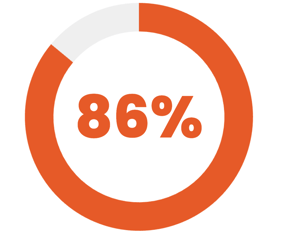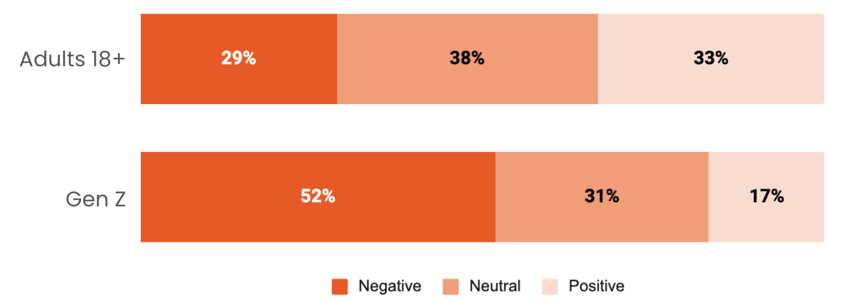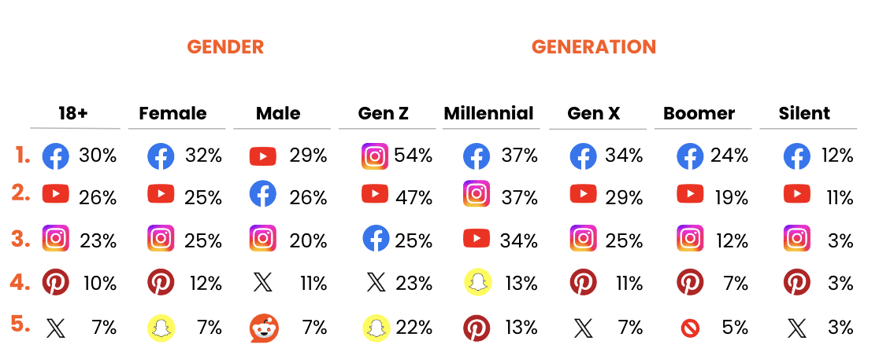Shortly after the TikTok ban was signed into law, DISQO took the pulse of TikTok users about the ban, which went into effect on January 19, for a few hours. President Donald Trump signed an executive action upon entering office on January 20, giving the app a 75-day reprieve. Read the latest on the TikTok ban here - including shifts in sentiment and what marketers should do to prepare for volatility in social media advertising.
Since its introduction in 2017, TikTok has surged in popularity, captivating millions worldwide with its short-form video content. Its addictive nature, diverse range of authentic creators, and innovative features have propelled it to the forefront of social media, especially among Gen Z.
Still, the Chinese-owned platform has had its troubles. Especially in the last couple of years, as people questioned whether it could operate independently under Chinese ownership and the government acted to ban the platform. These issues led to Congress passing a bill on April 23, 2024 that effectively bans TikTok if it is not sold within the next year.
But, TikTok isn’t going anywhere soon. Anticipating the potential shift in the TikTok advertising landscape, brand experience platform DISQO asked consumers what they think about the ban. We dive deeper into the power of TikTok to influence consumer attitudes and purchase intentions in our 2024 TikTok report update.
There is high awareness of the TikTok ban
Eighty-six percent of people were aware that the US government was considering legislation that would effectively ban TikTok. Gen Z – the biggest platform user – was the most aware at 94%.
Consumer awareness of TikTok ban

Question: Are you aware of the proposed TikTok ban?
Consumers share concerns about TikTok
Here, we look at how people feel about the ban in addition to their concerns about data safety and the potential for Chinese government influence. Overall, people were fairly evenly split about whether the ban is good or bad. However, Gen Z is not, with more than half saying they felt negatively about the ban.
How consumers feel about the TikTok ban

Question: How do you feel about the possibility of TikTok being banned?
While the bipartisan passage of the bill may seem as though the entire populace is on board with the ban, there are holdouts - mostly among Gen Z. Brands should navigate this period of transition prepared for both increased pressure from younger consumers to stick with the platform and increased awareness overall of the platform’s troubles.
Consumer views of “good” and “bad” are rooted in their feelings of safety. Almost a third (29%) think their data on TikTok is about as safe as its peers, but only 4% said it was more safe.
But, when you look at those who support the ban and how they felt about platform safety, it is clear that safety concerns drove their support. A significant majority (69%) of those who felt extremely positive about the ban said the platform was much less safe than other social media platforms. Whereas 61% of those who felt extremely negative about the ban felt that the platform was just as safe as others. It is worth noting that still only 13% of this group felt the platform offered more safety.
We also wanted to know if consumers share the same concerns about Chinese ownership as their elected representatives. For the most part, yes, they do. Overall, 52% of respondents said that Chinese ownership of the platform concerned them, and 30% said it did not. But Gen Z is flipped, with 57% saying they’re not concerned and 25% saying they were.
Concerned about Chinese ownership

Question: Does it concern you that Tik Tok is owned by a Chinese company?
In passing the law, many elected officials cited concerns not just about data security, but also about the potential for China to influence American politics through the app. Consumers share their concerns, with only 13% saying the platform was safer than others and 39% saying it was worse.
If TikTok is banned, where will consumers go?
A TikTok ban could yield new social media winners down the road. Where will consumers spend their time if TikTok disappears? The answer, of course, varies by gender and generation.
Top five TikTok alternatives

Question: If TikTok was unavailable in the US, which social media platform(s) would you spend more time on?
Bottom line: what does a TikTok ban mean for brands?
While brands may have some time to prepare for the ban as they wait for what promises to be a drawn-out legal battle, the time is now to prepare. TikTok’s force in the social media landscape cannot be denied, and consumer sentiment will evolve during the battle.
The need to stay on top of consumer attitudes and measure the effectiveness of social media campaigns will only grow in significance. Brands using TikTok for business should adopt a test-and-learn strategy to ensure they are ready for shifts as they happen.
Download our 2024 update on TikTok advertising for business, how the TikTok Shop has changed social media shopping, and how the ban will impact US consumers.
Methodology
Through the DISQO brand experience (BX) platform, we asked more than 15,000 people (n=15,242) about TikTok between April 17 - 19, 2024.





.jpg?width=352&name=DIS_InGameAdvertising_PreRelease_Web_Header_1000x666%20(1).jpg)